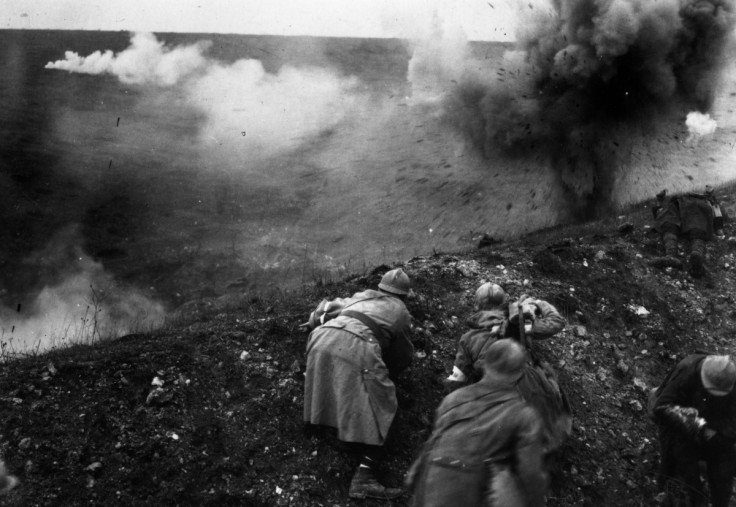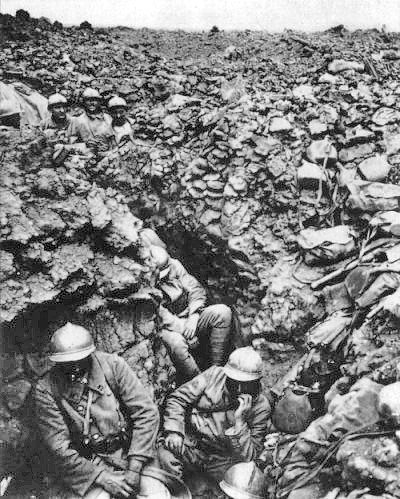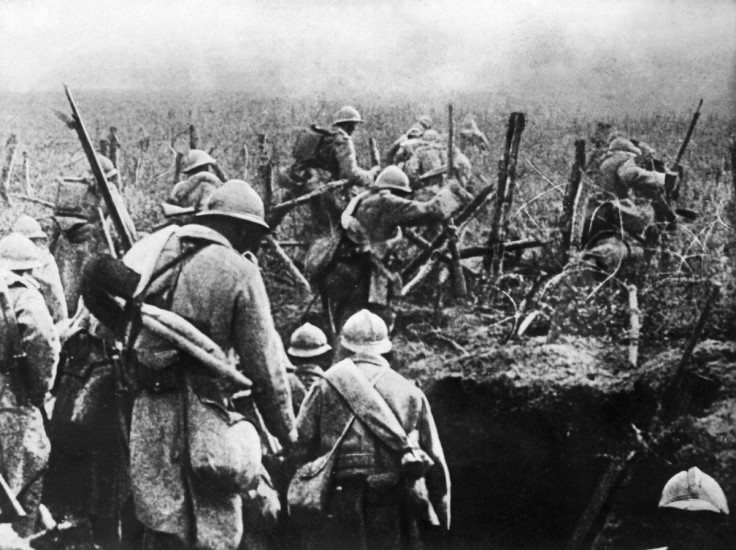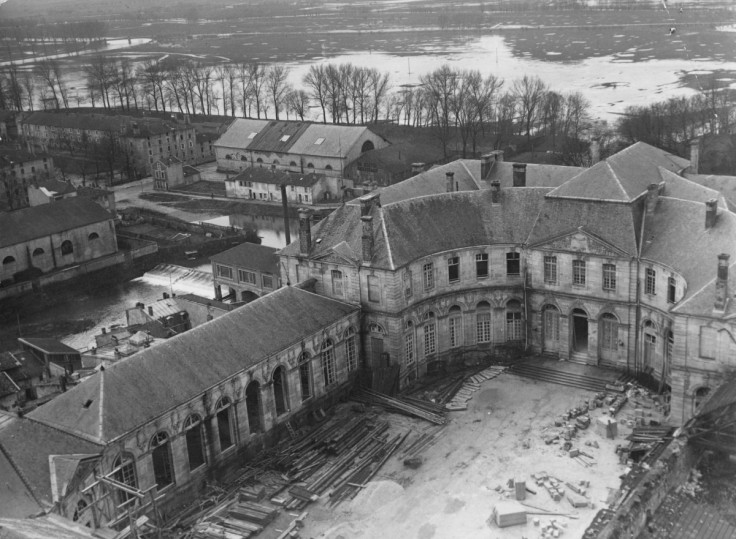Verdun WW1: Shredded flesh and pulverized corpses - one French soldier's harrowing account

Today marks the 100th anniversary since the Battle of Verdun began. Lasting 300 days and leaving an estimated 800,000 soldiers dead, wounded or missing, it has come to signify one of the bleakest and bloodiest parts of warfare on the Western Front during the First World War.
Louis Barthas, a 35-year-old barrelmaker from a small wine-growing town in France, was conscripted to fight in the opening days of the First World War and spent four years in near-ceaseless combat. He wrote 19 journals chronicling his experiences.
In an extract from the book detailing his time at war, he describes the Battle of Verdun, which took place 21 February to 18 December 1916.
As day broke, I looked out upon this famous, nameless hill. Our trench lay at the foot of it. For several months the hill had been disputed as if it had diamond mines on its slopes.
Alas, all it contained now were thousands of shredded, pulverized corpses. Nothing distinguished it from neighboring hills. It seemed to have been partly wooded at one time, but no trace of vegetation remained. The convulsed, overturned earth offered nothing but a spectacle of devastation.
All day long we stayed close to the ground, huddled in this covered trench, suffering from heat and lack of air. The Boche planes hadn't spotted us, so we weren't bombarded by howitzer fire. We waited impatiently for nighttime, when we could walk around and breathe at our leisure. But at nightfall our company received orders to go forward and occupy a trench a couple of hundred meters ahead.
After a prodigious expenditure of all sorts of projectiles, these two regiments moved forward and reconquered, or rather simply reoccupied, some positions they had previously lost
Separately, by squads, we made our way there. The terrain had been much more heavily bombarded than what we had seen farther to the rear, at the mill at Esnes. I think that the strategic necessity which brought us there was simply to provide more security and peace of mind for our colonel, whose deep dug-out was right nearby.
But what had the 114th and the 125th Regiments of our division already done to retake Cote 304?
The official army dispatches, and even the least jingoistic newspapers, depicted the fantastic charge of these two superb regiments, hurling themselves forward with an irresistible élan, handing this little volcanic mountain over to tearful Pétain and Joffre.
The truth was altogether different. After a prodigious expenditure of all sorts of projectiles, these two regiments moved forward and reconquered, or rather simply reoccupied, some positions they had previously lost, because the Germans had pulled back to their own lines without waiting for the assault. Which isn't to say that the losses weren't substantial on our side.
In brief, things were as they were before May 5: the French on one side of the hill, the Germans on the other, the crest once again a neutral zone blasted by the two artilleries.
***
In reality this wasn't much more than a miserable boyau dug, in one night, by troops who were hanging on there and who, the next day, were pulverized by howitzer fire.
There, human flesh had been shredded, torn to bits. At places where the earth was soaked with blood, swarms of flies swirled and eddied. You couldn't really see corpses, but you knew where they were, hidden in shell holes with a layer of dirt on top of them, from the wafting smells of rotten flesh.
There was all sorts of debris everywhere: broken rifles; gutted packs from which spilled out pages of tenderly written letters and other carefully guarded souvenirs from home, and which the wind scattered; crushed canteens, shredded musette bags – all labeled 125th Regiment. I was easily able to replace the munitions, rations, and tools which I had cast off during the march up to the front.
The sight of this gloomy tableau suggested to us that the next day, once the Boches spotted our presence there, they would pound us into marmalade. All night long we were put to work, making the boyau practicable and habitable. At the first light of dawn, to our great joy, the sky was covered with low- hanging clouds which enveloped Cote 304 with an opaque veil, masking us from the enemy all day long.
You couldn't really see corpses, but you knew where they were, hidden in shell holes with a layer of dirt on top of them, from the wafting smells of rotten flesh
At any moment, with no evident pattern, the Boches fired salvos of shells. Pressed into the deepest recesses of the boyau, we didn't have any wounded that day.
That night, our battalion had to go up to occupy the firing line. At the appointed hour we headed out, following the Rascas boyau, which soon was no more than a muddy ditch, collapsed in places.
Why, and how, had the order come for us to stop in this place?
Some botched-up relief schedule, no doubt. Or a designated path which was no longer there.
We were crouching down, so as not to catch a stray bullet or shell fragment passing by. And if this weren't bad enough, a heavy rain started to fall. It didn't take long for the water to fill the ditch, and to submerge our shoes. Our helmets were transformed into drain spouts. Little waterfalls ran down our packs onto our hips, off our shoulders and along our arms. We didn't know what, or whom, we were waiting for. The night was pitch black. Were they just going to leave us stuck in this sewer?
Finally we moved out again. Soon, no more boyau. We had to cross over an entanglement of barbed wire, fence posts, shredded sandbags, dead bodies, all sorts of debris. Some of us got lost, or got stuck on the prickly barbed wire which you couldn't see in the dark of night, which grew even darker after each shell burst.
***

Everything was sinister in these places, but this place was even worse, if that's possible. At the bottom of the ravine, where the Ruisseau [stream] des Forges flowed, shells of every caliber, fired by both sides, fell without respite. This dark abyss seemed like a volcano in constant eruption, and there we were, hanging right on its rim.
Our mission consisted of maintaining liaison, by patrols, with the troops who held the facing slopes. But these patrols took place only on paper, in fictional reports. In reality, the patrols had ceased after three days – there was no one to send out on patrol.
The morning after our arrival, curiosity led me to inspect the immediate surroundings of our emplacements. We were still protected by a veil of fog which the May sun would soon dissipate. Just then, in a shell hole, I saw the body of a soldier, thickly encrusted from head to toe in dried mud.
"Well," I said, "here's a dead one already." And I poked him with my foot, to make sure he was no longer among the living but had entered the realm of Pluto.
The reply was a protest: "Leave me alone!" And in this grumbling I recognized the voice of my fellow Peyriacois, Edouard Durand, who was in the 4th Section with me. Stupefied, I asked him how he had gotten into this comatose state.
He told me how, tangled up in a jumble of barbed wire, he couldn't get himself loose until nightfall, after much trouble, and then he couldn't rejoin our section, which had disappeared in the darkness.
After having wandered around for hours, he finally was able to rejoin his squad at daybreak.
"But," I told him, "don't stay there, immobile, all soaked on the damp ground. Get up, and shake yourself off!"
Overcome with fatigue, he didn't budge.
"One way of croaking is just as good as another," he said. And I wasn't able to pull him out of this state.
***
That evening, Sergeant Fontès got the mission from Sublieutenant Lorius to take with him a "courageous" fellow and, that night, to reconnoiter and to find out who was up ahead of us: subjects of the Kaiser, or of Poincaré.
Sergeant Fontès couldn't find one volunteer in the section who sought to earn the label of "courageous."
Each one had a perfectly good reason to invoke: One had blisters on his feet, another had rheumatism, yet another could prove that he been in the latest patrol. Young men begged off because of weakness, old men out of exhaustion.
Finally, reluctantly, Sergeant Fontès turned to me – the ex-corporal who had been busted in rank for his advanced socialist ideas and his pacifism. He spoke to me not as a superior, but as a comrade and even as a friend.
In some places the ground was worked over, slashed and overturned as if by a recent earthquake. Any living thing had been snuffed out
I accepted, but with conditions that took a lot of the shine off my apparent zeal. I demanded to be exempt from three nights of outpost duty, patrols, and chores.
With nothing more than a rifle, a bayonet, and two packs of cartridges in our pockets, the two of us headed out. A sliver of moonlight shone the way for us, across a terrain as pockmarked as a kitchen strainer. In some places the ground was worked over, slashed and overturned as if by a recent earthquake. Any living thing had been snuffed out.
After covering a few hundred meters of this chaotic terrain, our senses were able to discern the limits of this immeasurable horizon of nothingness. We thought we were lost in the middle of an immense desert. It was impossible for us to tell from where we had come and where we were going. Crouched in a shell crater, we sought in vain to orient ourselves by flares, or by the sound of artillery batteries firing.
All of a sudden the jumbled sound of voices reached us. Anxiously we listened: a German patrol? A French work detail?
***
It was a providential ration detail from my old company, the 21st, Captain Hudelle's, which was just passing by us.
These men gave us precious information, and told us that a segment of the French front line was about 200 meters ahead of us. "So," I said, "Any losses today?"
"Well, we're starting out nicely," they said, "Cabanel the barber got killed. Sergeant Laflorencie is mortally wounded. Some others, too."
The most terrible accident had befallen my former section. Three of my old pals, fooled by either a moment of calm or their own bravado, decided to make up a game of manille, without finding a fourth hand. No sooner had the cards been dealt than a 105mm shell fell right in their midst, blasting them to bits. Only Corporal Larche was able to cry out, "Oh my God, my God!" The other two unfortunates were Corporal Peyre and Private Courtauly.
If I had still been with them, wouldn't I have been tempted to take up the fourth hand of this fatal manille game? And right now wouldn't I be blown to pieces, like my luckless comrades? It gives me chills just to think about it.
Our buddies told us that two or three hundred meters in front of us we'd find scattered remnants of the 22nd Company. To cover this distance we had to tumble into a crevasse, a kind of twisted corridor which linked one shell hole to the next. This was the front-line trench, or rather a segment of it, which the soldiers, silent shadows, dug out and extended while others, flattened against the slope, immobile, seeming to sleep with rifles at hand, burrowed into the darkness.

***
We had hardly gotten back, at about 9 pm, when bursts of machine gun fire were unleashed upon Cote 304, which was thrown into turmoil. Our little corner wasn't too badly pounded. To the sound of this infernal music, dead tired, crouched in the trench, I fell asleep as easily as in my own bed at home when I drifted off to the sound of raindrops on the gutters.
At dawn, I awoke to a cold and damp sensation on my knees, which stuck out from the little excavation I had dug in the side of the trench, my little bedchamber. It was the rain which was coming down in buckets, and which would fall all day long.
But far from complaining, we rejoiced. No sun meant no German airplanes overhead, no "sausages" – it was a truce, a rest. We were free to walk around, to chat, to stick our noses out of our holes, to get some food brought up from the rear. This was a blessed rain. We would have been happy to spend all our time on the firing line in water up to our necks. But on the morning of May 16 a cool breeze swept the sky clean of clouds, and a bright sun rose.
It didn't take long for several enemy airplanes to make their bothersome droning heard, and they circled over Cote 304 and the Mort Homme all day long, like birds of ill fortune foretelling a great storm.
We talked about the next furlough coming up, the overdue relief we were waiting for, our homes where our loved ones would shudder to know what a hell we were living through
Naïvely we thought that our own aviators would arrive and chase these interlopers away. But no such luck. Today, and every day after, they came with impunity, in total freedom, swooping back and forth at low altitude, scouting out and scrutinizing the emplacement of our positions.
This reminded our Colonel Douce: "When we were in Artois, they told us that German airplanes were being shot down every day over Verdun. Now that we're here, the daily communiqués say that's what's happening in Artois."
As a result, we were condemned to complete immobility. We had to conceal anything that would reveal our positions: tools, arms, mess kits, packs, everything had to disappear, and ourselves, too, under penalty of receiving an unannounced avalanche of shellfire.
***
Our brains were shaken by the nearby explosions. Stunned, we expected to be pulverized at any minute. It was just a matter of being caught in a salvo.
Finally the hurricane of iron and fire gradually let up. Then came intermittent but almost regular barrages which landed haphazardly.
Heartened by this relative calm, five or six of us gathered under a thin sheet of corrugated metal, which would protect us from only the smallest shell fragment, but which gave us the illusion of perfect security.
We talked about the next furlough coming up, the overdue relief we were waiting for, our homes where our loved ones would shudder to know what a hell we were living through. Sometimes, when the storm raged too loudly, we had to interrupt our conversation, and pick it up again where a nearby explosion had cut short a sentence.
Suddenly a shell, with a harsh and brutal hiss, cut right through our sheet of metal as if it were a piece of paper, and burrowed into the slope of the trench without bursting.
Did we faint dead away? No. Once the first few seconds of shock passed, there was an outburst of laughter all around. Why the laughter? Who can explain the reason for it?
Was it the relief at escaping great danger? Was it what someone was saying, that was interrupted? Was it a kind of nervous reaction?
***
At midnight, with three comrades under the orders of Corporal Cazelles, we went out to occupy the outpost which was almost at the bottom of the heavily bombarded ravine.
While two men kept watch, the others went to work clearing away the many landslides caused by the latest bombardment of the boyau, or remnant of a boyau, which linked the outpost to the position occupied by our half-section.
Did the Boches hear the sounds of our tools? Or the noise of our irrepressible southern voices which we couldn't muffle? Had our outpost been found out?
They should train the schoolkids, every day, to crawl on their bellies. Some day, or some night, the knowledge might come in handy
Whatever the reason, all of a sudden a volley of small-caliber shellfire fell all around us with a crackling like fireworks. What kind of devilish device was this, which we hadn't encountered before – and never did again afterward? Doubtless it was some new kind of rapid-firing cannon which the Germans never used again (too bad for them). The firing lasted about 30 seconds, which seemed interminable, then started up again. These packets of shells tore up the earth all around us, whistled, farted, shot off showers of sparks and flames, and stirred up a storm of iron fragments, chunks of dirt, and stones.
Flat on our bellies with our noses in the dirt, we were terrified, disconcerted by this new way of scaring and killing people.
To tell the truth, these shells did not turn out to be excessively murderous. We realized it when, once things calmed down, we discovered that none of us had suffered the slightest scratch. But it's certain that these shells would have had a much more fatal effect on troops in the open.
We thought we were through with this vexing alert and we were laughing at our earlier fright when, click-clack, here is that satanic farting again, forcing us once again to dig our noses into the dirt. This time it didn't let up, which led us to think that they had chosen our listening post as the testing ground for this new device.
Looking ahead to the next war-to-end-all-wars, they should train the schoolkids, every day, to crawl on their bellies. Some day, or some night, the knowledge might come in handy.
***

We finally got out of the test-firing range of these new devices. A sonorous snoring that could come only from our buddy Sabatier told us that we were back among our comrades.
But once we were out of danger, Corporal Cazelles was suddenly overcome with scruples. He had abandoned the listening post under his charge, while everywhere else at Verdun the order was to resist without ever taking one step back.
In this massive, frightening void of gloom, where now no French soldier stood guard, he could see the whole army of the German Crown Prince rushing to the attack. I reassured him that as long as the Germans were firing into the ravine they wouldn't be taking a stroll there. Let's look after our own comrades. That's what's important.
At this moment, our ration teams arrived. Each night they went to pick up our meals, our letters and packages from home, at the field kitchens which were advancing, not without risk, on the road between Vigneville and Esnes.
A shot of hooch could set aside our little nighttime cares. Right then the snoring of Sabatier ceased. A 420mm shell falling right next to him might not have awakened him, but the one word "hooch," or just the smell of it, got him up right away.
***
To make it worse, as I have already described, all of us, one after the other, suffered from an epidemic of intestinal disorders. The resulting diarrhea sure cleaned us out, but inopportunely. As soon as one of us got over it, his next door neighbor was afflicted with it, and had the bad luck to have to climb out of the trench and head for the shell hole which served as a latrine. Of course we did this only as a last resort, at the last moment of agony, stretching our guts until they were about to burst.
At least sheep are unaware of their fate. Right up to the moment of their death they're probably thinking that they're heading out to pasture, in a nice meadow
One of us was surprised in the latrine by one of these sudden fusillades, and collapsed into his own excrement.
So as not to expose oneself to similar incidents, some used sardine or "monkey-meat" cans as chamber pots, so as not to have to leave one's hole in the ground. One even sacrificed his cast-iron dinner plate.
***
I was by myself, at the far end of our little stretch of boyau, crouched in a little hole, when a big shell landed like a thunderbolt just three or four meters in front of me. The violence of the blast tore away the tent cloth which I had arranged in front of my hole, to keep out the sun and the flies, and tossed it who knows where. As for me, I had the sense of being knocked flat, and for a few seconds I couldn't get my breath. I had just felt the death wind. Some say it's chilly; I found it hot and burning. It coursed through my whole body, from my rattled brain, to my heavy heart and lungs, all the way down to my rubbery legs.
***
On both sides they fought like cannibals, with a cruelty perhaps greater than in the long-ago times of the barbarian invasions. Vae Victis! [Woe to the conquered]. It was bad luck for anyone on Cote 304 who fell, still alive, into enemy hands. All human sentiment was banished. I myself saw a lieutenant fire on German stretcher-bearers carrying a wounded man. To a soldier who had the courage to criticize this misdeed, the officer replied, "Aw, hell, the Germans would have done the same."
***
Liaison duty on Cote 304, the day of an attack – that's no sinecure. But I volunteered immediately. I wasn't ignorant of the dangers I would be running, but if I had to be there I would a hundred times rather die with a dispatch in my hand than with a rifle which had just killed a fellow working man like me, a brother in misery and suffering. No, I'm not going to perish with that on my humanitarian, socialist conscience.

***
Where were the journalists who cynically affirm that our soldiers stormed up Cote 304 and the Mort Homme furiously, enthusiastically, singing, men whose chiefs couldn't hold them back? They weren't there that afternoon to see the lamentable parade of human wrecks, a flock of sheep headed for the slaughterhouse. But at least sheep are unaware of their fate. Right up to the moment of their death they're probably thinking that they're heading out to pasture, in a nice meadow.
***
Later I read a book by Captain Henry Bordeaux, an Academician, The Last Days of the Fort of Vaux, 13 where there is plenty of whitewashed nonsense. He wrote about liaison runners; if one fell, another took his place. Those who were left were always at the ready; they even offered their services before their turns came along. In other words, this Academician would say that they would be happy to go get themselves killed. In ordinary times a liaison's job was a lucky one, and no one turned it down. In a nasty sector they still had to do their jobs. But to say that they jumped to the head of the line – that's too much.
© Copyright IBTimes 2025. All rights reserved.






















